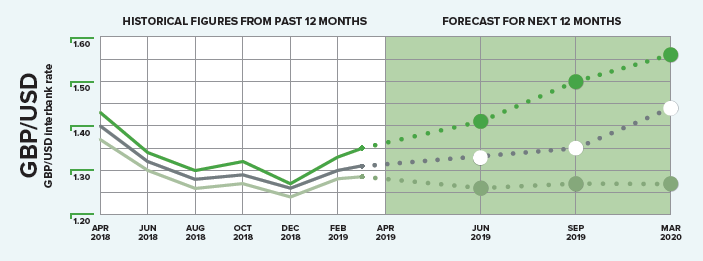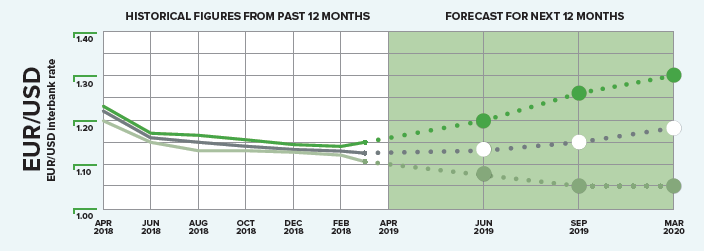If you’re transferring money overseas, such as from pound or euro to dollars, then you’ve got some planning to do. It’s been a volatile quarter and, as our forecasts show, this unpredictability isn’t set to abate. So, what are the key things to look out for, and how can you protect your money against the risks they entail?
1. US-China trade war
With the effects of the ongoing US-China trade war being felt across the world, there are high hopes for positive developments in the near future, and ideally a resolution by the end of April. The positive rhetoric from both sides is promising and they have apparently found solutions to several difficult issues.

The US-China trader war will be one of the key drivers over the next quarter.
However, it is thought by some economists that the deal could provide only a short-term remedy, rather than a long-term solution to this economic rivalry between the two nations. A delay could cause the dollar to weaken against third currencies like the pound and euro, while a breakthrough will likely send it upwards.
2. Global economic slowdown
You’ve probably heard talk of a global economic slowdown. The eurozone has been posting poor economic reports for a while, which has helped to buoy the dollar against the euro.
By comparison, the American economy is sending more mixed signals. After a disappointing February, Non-Farm Payrolls beat expectations with 196,000 jobs added in March. February’s disappointing number of 20,000 was revised up to 33,000. However, wage growth slowed to 3.2%. There was also a surprise fall in manufacturing jobs, which were expected to increase by 10,000, but instead fell by 6,000, potentially signalling that America’s tough stance on trade is taking its toll. However, the overall positive figure of 196,000 could be a signal that although the US economy is slowing, it is strong in comparison to the global downturn as a whole.
3. Trump’s border
President Donald Trump has continued with his border-wall-related threats, declaring that he will close large sections if Mexico doesn’t immediately stop all illegal immigration into the United States. He has also acknowledged that closing the border would hurt the economy, but added that ‘security is more important than trade’. We know from the government shutdown in January that Trump is willing to take risks that may damage the economy, so closing the border would probably be no exception. The question now is whether or not he will listen to his advisers, who are reportedly saying that even partially closing the border could have severe economic consequences.
4. Brexit
It seems never-ending, with a new postponement until 31st October, but Brexit is still one of the key drivers in the markets. Even if you’re exchanging into non-European currencies, like the US, Australian or Canadian dollar, it still has an important impact. A Brexit announcement that pushes the pound down will consequently push the dollar, for instance, up. Party talks are said to have stalled, with talks of another vote soon – but absolutely no-one can 100% predict the outcome.
5. Changing data
It’s also important to remember that US economic data is only just starting to become reliable again, following the Government shutdown in January. This will have had the double impact of slightly affecting growth and also producing unreliable data during that period (since the reports are generated by government employees). The data would have continued to be somewhat unreliable for a couple of months after the shutdown.
It’s likely that the US economy will continue to slow in the next quarter, but as data becomes more reliable in the coming months, it will begin to paint a more honest picture of what the economy really looks like. And that could affect all economies globally, from Canada to Australia.
How can I protect my money?
As you can see, there’s a lot on the horizon. But, while we can tell you what is expected to happen, we can’t say what will happen – or what the exact effect that will have on the pound or dollar will be. Just take a look at the major banks’ forecasts below. None of them agree on a single figure.


So, what can you do? Well, don’t try to play the markets unless you’re happy to expose your money to serious risks. Buying $200,000, such as for a house, in pounds over the last twelve months could have seen you paying an extra £10,000 depending on the day you paid.
Instead, a forward contract lets you fix in the same exchange rate for up to twelve months, at no extra fees. That way, you have surety that the amount you’ve budgeted to pay is what you will pay – no matter if the markets suddenly move.
To find out more about a forward contract, download your Emigration Guide below, or speak to your Personal Trader on 020 7898 0541.





















